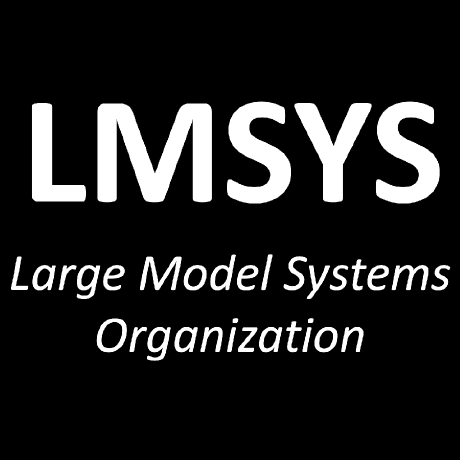Discover and explore top open-source AI tools and projects—updated daily.
FastChat by  lm-sys
lm-sys
Open platform for training, serving, and evaluating LLM-based chatbots
Top 0.8% on SourcePulse
FastChat provides an open platform for training, serving, and evaluating large language model (LLM) based chatbots. It is the engine behind Chatbot Arena, a popular platform for comparing LLM performance, and offers tools for researchers and developers to deploy and benchmark their own models.
How It Works
FastChat employs a distributed architecture for serving LLMs, comprising a controller, model workers, and a web server. This design allows for scalable deployment of multiple models and provides OpenAI-compatible RESTful APIs for seamless integration. It supports various inference backends and quantization methods for efficient deployment.
Quick Start & Requirements
- Install:
pip3 install "fschat[model_worker,webui]"or from source. - Prerequisites: Python 3.x, PyTorch. GPU with CUDA is recommended for performance. Specific models may require
transformers>=4.31for 16K context. - Resources: Vicuna-7B requires ~14GB GPU VRAM; Vicuna-13B requires ~28GB. 8-bit quantization reduces memory by ~50%.
- Docs: FastChat, Demo, Chatbot Arena
Highlighted Details
- Powers Chatbot Arena, serving 10M+ requests and collecting 1.5M+ human votes for LLM Elo rankings.
- Supports a wide range of LLMs including Vicuna, Llama 2, Falcon, Mistral, and API-based models (OpenAI, Anthropic, Gemini).
- Offers OpenAI-compatible RESTful APIs for easy integration.
- Includes MT-Bench for multi-turn evaluation and LMSYS-Chat-1M dataset.
Maintenance & Community
Licensing & Compatibility
- Code is typically under Apache 2.0. Model weights (e.g., Vicuna) are subject to their base model licenses (e.g., Llama 2 license).
- Commercial use of model weights depends on their respective licenses.
Limitations & Caveats
- 8-bit quantization may slightly degrade model quality. CPU offloading is Linux-only and requires
bitsandbytes. - Performance can vary significantly based on hardware and chosen inference backend (e.g., vLLM integration for higher throughput).
8 months ago
1 week

 v2rockets
v2rockets jasonacox
jasonacox BigSweetPotatoStudio
BigSweetPotatoStudio labsai
labsai rikkichy
rikkichy jakobdylanc
jakobdylanc Jittor
Jittor LinkSoul-AI
LinkSoul-AI nichtdax
nichtdax sugarforever
sugarforever AstrBotDevs
AstrBotDevs oobabooga
oobabooga